Publications
When there are new challenges to rise up to, KAIST CAF will be at the very forefront.
Publications
Total : 59
-
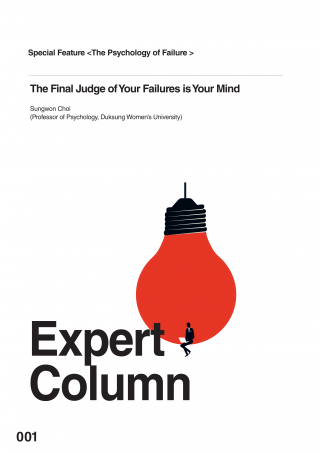 Expert ColumnThe Final Judge of Your Failures is Your Mind
Expert ColumnThe Final Judge of Your Failures is Your Mind2023-12-22
Sungwon Choi (Professor of Psychology, Duksung Women’s University)
Special Feature <The Psychology of Failure The Final Judge of Your Failures is Your Mind Sungwon Choi (Professor of Psychology, Duksung Women’s University) The world is changing at a breakneck pace. Information is spreading faster than ever, and technological advancement is accelerating. However, such rapid developments may be forcing us to make decisions and think far too quickly. It is inadvisable to respond to the inevitable experience of failure with hasty conclusions. Your failure may have resulted due to an unimaginable number of variables, some of which may even be of a cosmic nature. Being forced to draw hasty conclusions can cause people to attribute the cause of their failures to societal inequality or the ineffectualness of one’s circumstances. Certainly, facing the world alone is undeniably challenging, but giving up quickly only accelerates the erosion of one’s resolve. Sometimes, it is necessary to take as much time as necessary to accept one’s failures and sift through the complex web of meaning lying within. Sometimes, the path to success is the slower and less straightforward route.
Origin
Download -
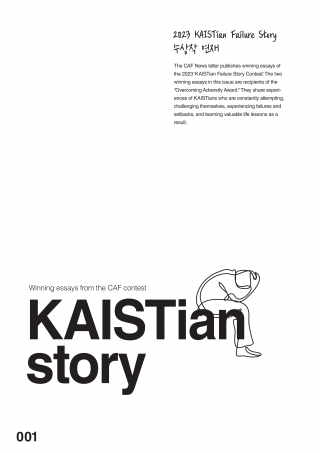 KAISTian StoryCarrying my failures along with me
KAISTian StoryCarrying my failures along with me2023-12-22
Yunseo Lee (KAIST School of Electrical Engineering)
Winning essays from 2023 KAISTian Failure Story Contest Yunseo Lee (KAIST School of Electrical Engineering) I think the most important thing is to have courage – the courage to be able to view a failure as something that should just be appreciated as it is. However, simply remaining stationary and staring at the failure will do you no good; a much better approach would be to wholly examine the failure and consider it something to ‘carry with you’ on your journey forward. Even now, my face becomes flush red and my heart starts pounding whenever I am under the spotlight. Anyone who has seen me give speeches will have heard my shaking voice, seen my trembling hands, and noticed my shuffling feet. Nevertheless, I still take the time for self-reflection after such moments to objectively analyze my performance from the audience’s perspective. Once that is done, I move on with my life. I can attest to the fact that I am slowly becoming more confident whenever I speak. This growth started when I decided to accept my failures and carry them along with me.
Origin
Download -
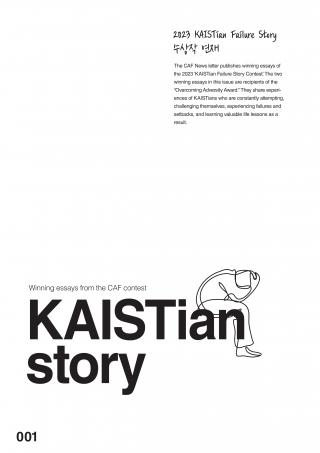 KAISTian StoryMy self-esteem journey: embracing growth and progress
KAISTian StoryMy self-esteem journey: embracing growth and progress2023-12-22
Mammadova Fakhriyya (KAIST School of Electrical Engineering)
Winning essays from 2023 KAISTian Failure Story Contest Mammadova Fakhriyya (KAIST School of Electrical Engineering) Now, I prioritize embracing the learning process. My perspective has changed, recognizing that the establishment of a healthy self-image is an ongoing and evolving journey rather than a fixed destination. I have come to value every step forward, understanding that growth and learning demand vulnerability and openness to new experiences.
Origin
Download -
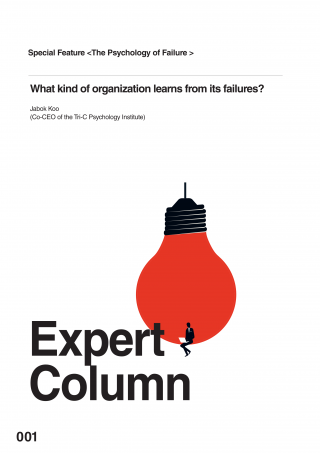 Expert ColumnWhat kind of organization learns from its failures?
Expert ColumnWhat kind of organization learns from its failures?2023-12-20
Jabok Koo (Co-CEO of the Tri-C Psychology Institute)
Special Feature <The Psychology of Failure> What kind of organization learns from its failures? Jabok Koo (Co-CEO of the Tri-C Psychology Institute) Leaders need to constantly make sure their organization’s systems and policies are helping to build an environment where people can be protected and safe when taking on challenges or even after failing. Consistency is vital, as that will allow a new organizational culture to take root. Unlike a company’s motto or ideology, an organization’s culture is shaped by the collective experiences of its members during their time in the group as well as the beliefs they ultimately adopt. In other words, the members learn the culture of an organization by seeing who gets promoted, who gets paid more, and who is given roles of responsibility. Once they accept the culture, they start believing in it and work accordingly. This is because the essence of an organizational culture stems from the unspoken beliefs (subconscious beliefs, perceptions, thoughts, and emotions) residing in the minds of its members. These beliefs are shared with others as people work and interact with each other within their organization, and they are the most important factor that can determine whether a company succeeds or fails.
Origin
Download -
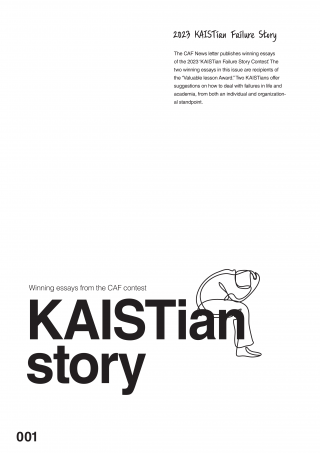 KAISTian Story180-Degree Turn
KAISTian Story180-Degree Turn2023-12-20
Cheeyoung Ahn (KAIST Graduate School of Culture Technology)
Winning essays from 2023 KAISTian Failure Story Contest Cheeyoung Ahn (KAIST Graduate School of Culture Technology) Life is not always smooth sailing, but then again, it wouldn’t be much fun if it was. Sometimes the waves are rough and the sea becomes turbulent due to strong winds. Is it not natural for life to also be constantly changing and taking on various forms? Your life will also be full of 180-degree turns and moments when everything turns upside down. I believe the secret to enjoying a rewarding and fulfilling life lies in embracing life’s most difficult moments with unwavering determination and a positive mindset.Changing the shape, direction, and angle of the lines of a shape will give us an even broader variety of shapes and forms. Even if my life is flipped over, distorted, or tilted in one direction, as long as my identity remains intact, I can constantly adapt to various crises by changing and evolving.
Origin
Download -
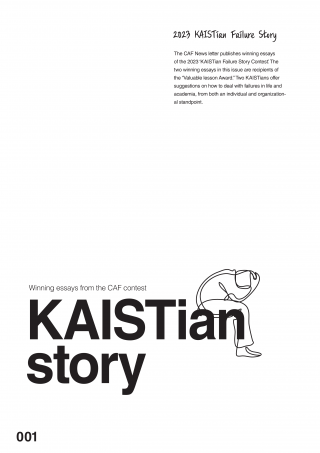 KAISTian StoryThe infrastructure of failure in academia: Embracing the norm and cultivating resilience
KAISTian StoryThe infrastructure of failure in academia: Embracing the norm and cultivating resilience2023-12-20
Nengroo Sarvar Hussain (KAIST Cho Chun Shik Graduate School of Mobility)
Winning essays from 2023 KAISTian Failure Story Contest Nengroo Sarvar Hussain (KAIST Cho Chun Shik Graduate School of Mobility) Finally, the valuable insights obtained from research on coping with failure have the potential for adaptation and application within the university environment. Utilizing diverse approaches, such as lectures, guest speakers, case studies, and role plays, could be implemented by creating a seminar or lecture series for graduate students, helping them navigate and cope with the inevitable failures they may encounter during their academic journey. While universities already ensure graduate students possess the necessary knowledge and skills for their rigorous research programs, only a few institutions genuinely address the emotional resilience required to handle the associated stress. By increasing awareness of academic culture, preparing them for potential challenges, and equipping them with coping strategies, universities can take a positive step toward fostering emotionally resilient and well-prepared students/scholars. Such efforts would contribute to a healthier academic environment that values the holistic development of its students.
Origin
Download -
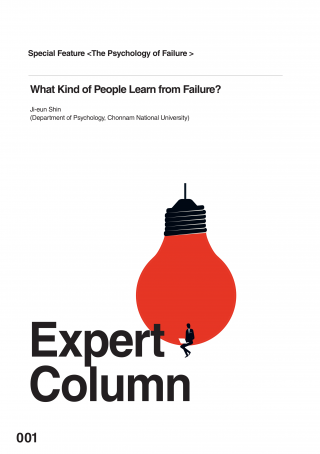 Expert ColumnWhat Kind of People Learn from Failure?
Expert ColumnWhat Kind of People Learn from Failure?2023-12-20
Ji-eun Shin (Department of Psychology, Chonnam National University)
Special Feature <The Psychology of Failure > 5 What Kind of People Learn from Failure Ji-eun Shin (Department of Psychology, Chonnam National University) Why is it important to learn from failure? Lessons gained from failure are likely to be inherently different in nature to those that can be learned from success, and they have unique characteristics that set them apart. In contrast to how success stories tend to share many similarities, failure experiences can vary greatly in their causes and circumstances. Therefore, our lives can become more enriched and balanced by learning from our failures. The failure to learn from failure does more harm than just limiting one’s learning opportunities: people can learn a great deal from others, so if an individual does not learn from their shortcomings and mistakes, the lessons embedded in those failures cannot be disseminated throughout society. In other words, society as a whole misses out on the opportunity to learn from failure. In this sense, we can consider an individual’s failure as a social asset, and a culture that embraces and actively shares such assets will serve as a key foundation upon which entire communities can grow.
Origin
Download -
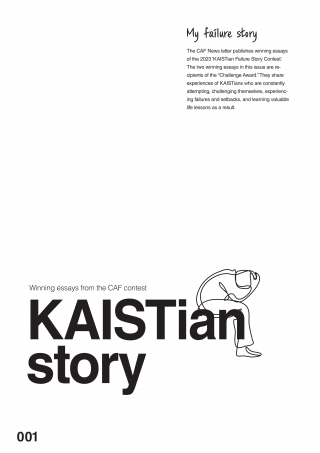 KAISTian StoryYou Are What You Set Your Mind Into
KAISTian StoryYou Are What You Set Your Mind Into2023-12-20
Sean Tristan De Guzman (KAIST Mechanical Engineering Department)
Winning essays from 2023 KAISTian Failure Story Contest Sean Tristan De Guzman (KAIST Mechanical Engineering Department) Finally, and perhaps this is the best lesson I took from the experience, you are who you set your mind to be. As long as willpower is coupled with a healthy mix of realism, it is more than enough to fuel my drive towards any goal I set for myself.
Origin
Download -
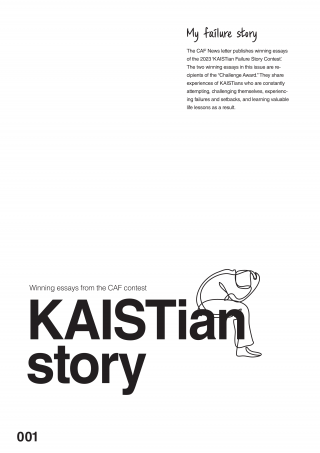 KAISTian StoryTriumph through Trials: A Journey of Resilience and Success
KAISTian StoryTriumph through Trials: A Journey of Resilience and Success2023-12-20
Syed Sheraz Ali (KAIST Mechanical Engineering Department)
Winning essays from 2023 KAISTian Failure Story Contest Syed Sheraz Ali (KAIST Mechanical Engineering Department) The power to shape your goals, success, and vision for a bright future and fulfilling life lies within your own hands. Learning to smile amidst the pains and challenges of life is the key to achieving anything you set your mind to. While the external world may seem beautiful, the inner light within you truly illuminates your path. Embrace positivity and strive for success.
Origin
Download -
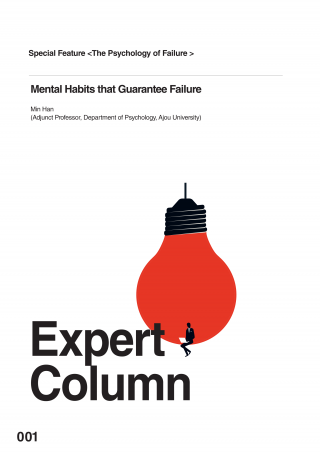 Expert ColumnMental Habits that Guarantee Failure
Expert ColumnMental Habits that Guarantee Failure2023-12-18
Min Han (Adjunct Professor, Department of Psychology, Ajou University)
Special Feature <The Psychology of Failure > 4 Mental Habits that Guarantee Failure Min Han (Adjunct Professor, Department of Psychology, Ajou University)
Origin
Download

